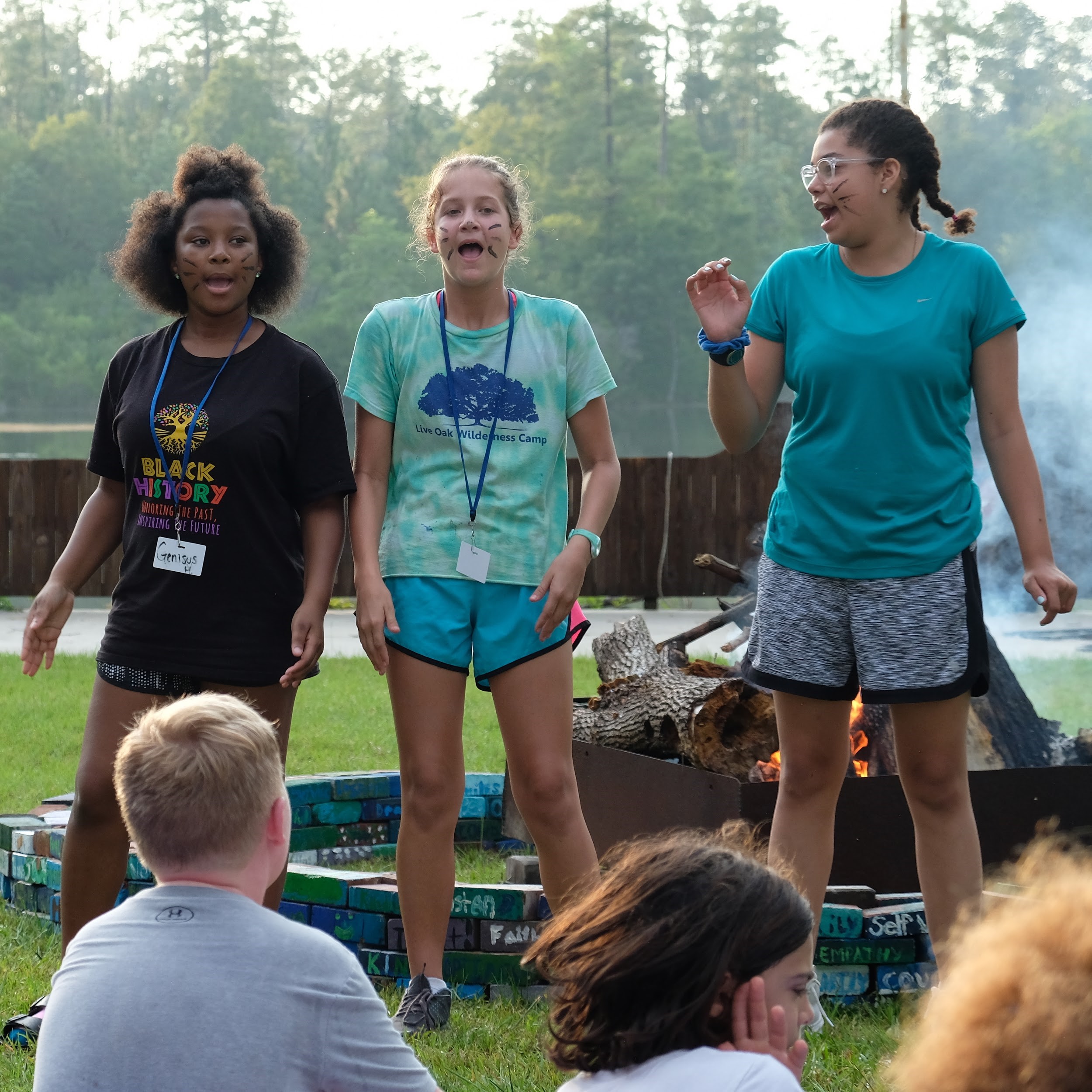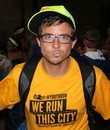
Oskie Creech
Campers at Live Oak Wilderness Camp
“Wait. What are we going to do?” The six 12- to 14-year-olds looked at each other as the skies opened up during dinner. This unexpected monsoon was not in the plan for their closing campfire after nine days at camp.
Let me explain the situation. Live Oak Wilderness Camp is a leadership development camp for kids in New Orleans. It has all the fun and laughter of any other summer camp, but also intentional opportunities for kids to be in control of their experience. For the past four days, these six kids were in a group called Camper Council, where their project was to design, manage and execute the closing campfire for the group of 150 people.

Caleb Dufresne
The fire was built and materials were gathered. They had even checked the radar, so this wrench from Mother Nature surprised all of us in the backwoods of Mississippi.
The rain intensified as the head counselor walked up to the group. “Hey team, wondering what the plan is. Is it cancelled, or should we get our rain jackets?” His question was to the team, but his eyes were on me.
I had to make a decision. One hundred fifty people were expecting an event tonight. It made sense that they looked at the program director to direct the program, but not anymore.
“That’s a good question. Camper Council, let me know what you decide. I’ll be finishing my dinner right here if you have any questions.”
I sat down and watched as this small group of New Orleans’ finest young teenagers huddled into a circle, flipped over their scripts and started brain dumping ideas for the — now indoor — fire.
The scene was a little chaotic. An announcement gave mostly clear directions, and energy levels were high from the rain, but that didn’t stop the magic. The team jerry-rigged a “fire” from flashlights and a red boa from the costume bin. They somehow got a counselor to play white noise of crickets in the background as everyone settled around the campfire. Instead of the planned order of songs, they opened the floor to representatives from cabins and then had an open mic of favorite memories from camp. It was beautifully made by campers. It was the best campfire in camp’s four-year history.
Moving Slow to Move Fast
It is important to point out that the letting go of leadership did not start the night of the campfire. It started three years prior when one of the directors said campers were asking to be more involved in ideas. He simply suggested a council of campers that could be involved in decision making as much or as little as they wanted.
That summer Camper Council was created. It made sense; we were a leadership camp after all. Ten campers signed up that first session and had one project: Plan the first ever camper campfire.
That first planning session was SLOW. It was very important to us as a group that this was camper led. So my job would be to help them think through their goals and facilitate questions to help them along the way.
There were days when it took the whole time to think up things like who’s going to collect the wood. But once they thought of that, it was their idea instead of me telling them what to do. So we let them struggle, and it wasn’t always fun. At the end of each hour, we would reflect on the successes and challenges of the hour as a team, and then they would be taught one little skill that they could use as a team for the next day. They were learning by doing, and the results were a deep connection and ownership to the project.
It was a slow process, but rewarding. Their second attempt at planning the campfire took just as long, but three years later, the Council had the ability to plan one as a team in just four hours. Never using the same script as the year before, but using the lessons learned.
Culture of Narration and Feedback
Every event at Live Oak is coupled with reflection. Sometimes it is fun and silly, other times deep and pondering. The point is that at all times, campers get a chance to reflect on both their own successes and the successes of others.
The same goes with any ideas and plans. Coaches are trained to ask, “Why are you thinking of doing that?” The campers have to explain the rationale for their decision to the rest of the group. A lot of times kids struggle with verbalizing their response at first. It makes sense: So much of life is about making decisions without having to explain why.
At camp we push in the other direction to teach them to explain out loud. Narrating decisions invites fellow campers into the conversation and unifies goals. This is another slow step, but as they practice working as a team it becomes natural and more efficient. Eventually they are running group conversations and making plans (what adults would call business meetings) without any assistance from their coach. The only difference is the kids want to be a part of these conversations, and I barely know any adults who want to go to meetings.
After each event at camp, we have a debrief as a whole group. Each camper gets to give a shout-out and an area for improvement for themselves and the group. This feedback goes beyond just saying “Good job.” We want to be specific with our praise and specific with our criticism so people can grow.
An example of our feedback model would be: “Tyreece, it was great when you stood by the youngest boys at the campfire because it gave them someone to look up to for the song, and you were able to quiet them down without speaking by just giving them a silent nudge.” The specific praise with evidence not only allows Tyreece to hear something he did well, it allows every other kid to learn from this moment. The shout-out allows all people to know a specific action they can do to help the group, even though this time it was just for Tyreece.
Different Isn’t Wrong, It’s Just … Different
The hardest moment for me as a leader was the moment Camper Council wanted to have a New Orleans dance-off at the campfire. Why, you might ask? Because I grew up going to camps where you didn’t have dance parties. There was a set way of doing things, and that didn’t fit the mold of what I knew.
I didn’t shoot the idea down right away, but I sure did push them on it. I took my role of asking tough questions to another level. “Why do you want to do this?” “Have you thought about the energy and flow of the night?” I was asking WAY MORE questions than I usually did, but every time, they had a thought-out answer, and I couldn’t find anything wrong with it. Eventually, I surrendered; this was their fire, and they wanted to do it.
There we were, sitting in nature, having a beautiful, relaxing evening. Next thing you know, they pulled out a speaker and hosted our first ever dance-off. In seconds, kids and adults alike were up, laughing and dancing with a joy that was beyond bliss. I was wrong. Their idea was genius and reflective of the group that was there.
In the world of development, we as leaders have to be ready for our youth to have final products that are different and unique. The individuality is a sign that we are doing the right thing for our kids. They are taking the reins and actually leading.
That way the next time it rains on your campfire, you can look at your campers and say, “What’s the plan?”
Caleb Dufresne is a program director for Live Oak Wilderness Camp, a leadership camp for kids in New Orleans that runs programming year long. Email him at caleb@liveoakcamp.com.





























